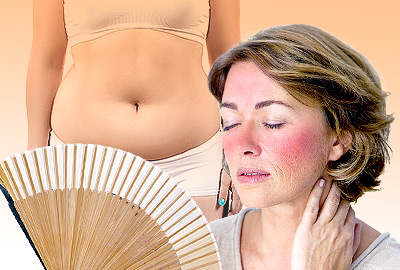
The signs of menopause are as varied as the women who suffer from them, but there are a few common symptoms, such as hot flashes, irregular periods, and low sex drive. Keep reading to learn more about the most common symptoms of menopause and what you can do to keep them under control.
Hot Flashes

More than 75% of women going through menopause report experiencing hot flashes. Hot flashes usually occur suddenly, with little warning, and cause flushing, sweating, and general discomfort. What can you do to prepare for your hot flashes? Pretend to be a secret agent: If you're at a crowded event, have an escape plan. Try to sit near an exit where you can flee should the need arise, and keep a bottle of cool water with you at all times. Dress in layers so you can remove items of clothing quickly and cool down faster.
Irregular Periods
Irregular periods are the one symptom of menopause that is completely unavoidable. Menopause ends when your period does, and before that, it will become irregular, with longer intervals between periods. Be prepared and keep pads or tampons with you at all times.
Loss of Libido

When starting menopause, the hormones responsible for female sex drive go into decline. However, this doesn't mean you have to give up sex if you don't want to. You can boost your libido by leading a healthy lifestyle including a nutritious diet, regular exercise, and making time for yourself to relieve stress. There's also a variety of bedroom techniques meant to stimulate libido that you can try.
Anxiety
Anxiety can be caused by hormonal imbalance during perimenopause. This can be a hormonal symptom, or it can also result from stresses in your life. Calming activities like meditation can help, as well as talking with friends. If it is largely hormonal related, working to try and balance your hormones through diet and exercise can help.
What Treatments Should I Seek?

Simple lifestyle changes can leave you feeling healthier, happier, and with significantly reduced symptoms. Incorporate exercise, healthy foods, and relaxing activities into your lifestyle. If that doesn't work, talk to your doctor about your options or look to alternative treatments like herbal supplements or acupuncture. Click on the following link to learn more about menopause treatments.
Sources
- BMJ Group. "Menopause: What is it?" Patient Leaflet. 2007.
- Hopkins, Virginia. Lee, John R. M.D. What Your Doctor May Not Tell You About Menopause. New York: Warner Books Inc., 1996.
- Love, Susan M.D. Menopause and Hormone Book. New York: Three Rivers Press, 2003.
- Martin, Raquel. The Estrogen Alternative. Rochester, VT: Healing Arts Press, 2000.



